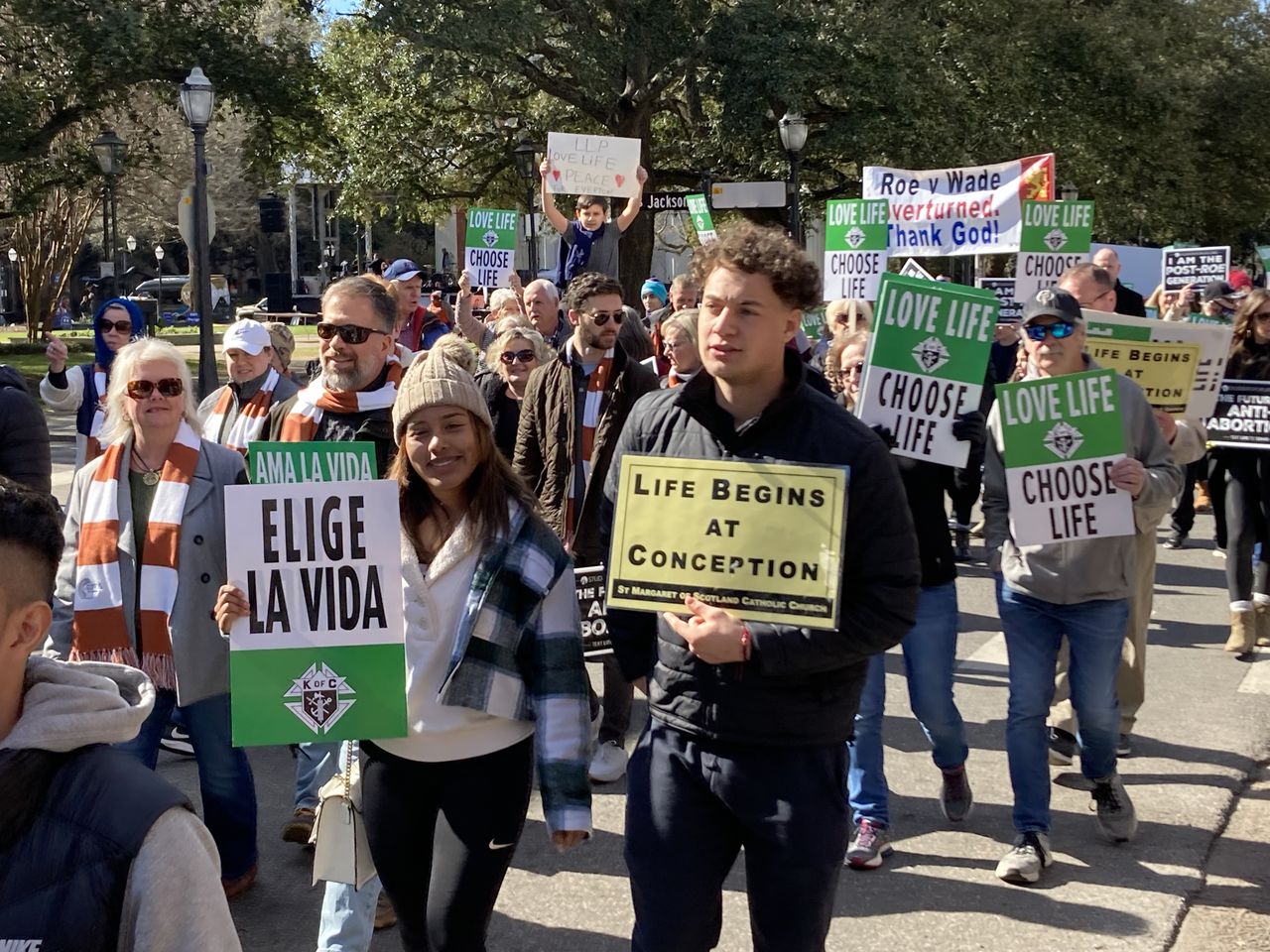After Roe, March for Life advocates in Mobile take aim at abortion pills
With the decades-long dream of overturning Roe v. Wade realized, Beth Perkins turned to the next battles on abortion access.
Perhaps no bigger battle awaits than the national focus on medication abortions, which have become the preferred method of abortion in the U.S. for the past three years.
“Abortion has not gone away just because Roe v. Wade is overturned,” said Perkins, co-founder of Mobile’s March for Life that took place Friday at Cathedral Square in downtown Mobile.
Related:
- Alabama Attorney General Steve Marshall urges feds to reverse decision on abortion pills
- Roe v. Wade: Alabama AG Steve Marshall halts abortions, says state ‘protector of unborn life’
The event featured anti-abortion supporters marching through the streets of downtown Mobile, some who said prayers as they walked past the bars and restaurants along Dauphin Street while holding up signs read, among other things, “Life Begins at Conception,” Love Life, Choose Life,” and “I Am the Post-Roe Generation.”
“Alabama, God bless Alabama, is pro-life,” said Perkins, 73. “We do not have abortion here. But many of the states do, and they are getting more radical with it. We are continuing to fight … we want to educate.”
The rally, the first since the U.S. Supreme Court’s ruling in June to overturn 1973′s Roe v. Wade decision, also featured Christian prayers, music, and speeches from anti-abortion activists like Sarah Eubanks of Mobile.
Eubanks, like Perkins, said one of the biggest concerns for the movement is the emergence of pills like mifepristone and misoprostol, two drugs used in more than half of abortions in the United States.
13
Mobile March for Life
The Food and Drug Administration finalized changes earlier this month to broaden the availability of those two abortion pills to pharmacies, including their mail-order access.
Medication abortion accounts for more than half of all abortions in the U.S., according to an analysis last February by the Guttmacher Institute. That report suggests that the 50% threshold for medication abortions was reached in 2020.
“We have to know that the abortion pill is not the answer,” said Eubanks, 54, once a pro-choice activist who converted to anti-abortion advocacy. “We have to celebrate the life God has created.”
Alabama is among 21 other states that have taken aim at the FDA’s ruling, urging the federal agency to reverse its decision, and calling it “illegal.”
Before the FDA’s ruling, people who use medication for abortions had to pick them up at specialty clinics.
The Justice Department, in a January 3 opinion, determined that the U.S. Postal Service can continue delivering mifepristone and misoprostol without violating a 1873 federal law known as the Comstock Act. That law restricts the delivery of items considered “obscene” or “immoral.”
The opinion notes that mifepristone and misoprostol can be used for other reasons than terminating pregnancies, and that state abortion bans include exceptions that make it difficult for someone who sends pills to know if they would be used in violation of those laws.
Alabama’s Human Life Protection Act, signed into law in 2019 and went into effect after the end of Roe v. Wade, bans abortion except in cases where the mother’s health is in danger.
The law has gotten some attention in recent weeks after Alabama Attorney General Steve Marshall, in expressing strong resistance to abortion pills, said women in Alabama who use them to end pregnancies could be prosecuted under the state’s chemical endangerment law. He later clarified his remarks and said that law enforcement would not go after women who take abortion pills but could pursue charges against people who provide medications.
Marty Carrell, CEO of the Women’s Resource Center in Mobile, said that while she and others are thankful for the Supreme Court’s ruling last year, the issue over abortion pills and other matters underscored an ongoing “battle” that is “not over.”
Mobile’s March for Life rally was the only one held in Alabama on Friday, and is an offshoot of the March for Life held every January in Washington, D.C. to coincide with the Roe v. Wade anniversary.
Perkins, who started the Mobile rally in 2017, said this year’s event was held off for one week while she and others traveled to Washington, D.C. to participate in this year’s national event.
The rally on Capitol Hill included a strategic route-change that took abortion opponents by the Capitol instead of the U.S. Supreme Court building.
Perkins said the crowd was massive despite the victory won at the Supreme Court.
She also said the crowd in Mobile was also large, underscoring continued interest in an issue that sparks passions and deep political divisions in America.
“Right now, with the (Biden) Administration, I don’t see anything going forward,” said Perkins, referring to any anti-abortion pushes. “All we can do is be peaceful and educate people and get them to know what abortion does.”
